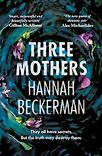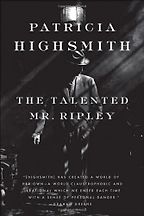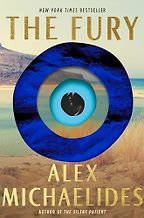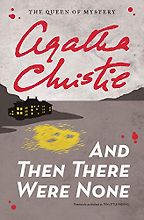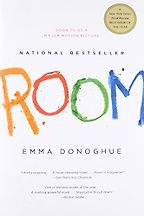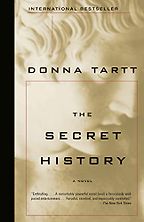As a reader, when you’re reading psychological thrillers with a twist, what is it that you’re looking for? What gets you excited about a book?
It’s interesting because a lot of people think that psychological thrillers are about plot, and that plot is most important. But I think it’s about character: you have to have character at the heart of these books. It doesn’t matter how twisty and turn-y the plot is, if you haven’t bought into the characters, if they’re not rounded and believable, if you don’t care about them (even to the extent that you might care to hate them), if they’re not people that you want to spend time with, even potentially in their awfulness, it wouldn’t be a successful psychological thriller. I read lots of psychological thrillers that are very much plot-driven, and the character is secondary, and they just leave me cold. So, for me, it’s about character.
In terms of the psychological thrillers you’re recommending today, there are quite a few classics and then one or two newer ones. How did you set about choosing them?
I thought about books that I had really enjoyed reading and still think about many years later. There’s only one very recent book, The Fury. Most of them are books that I read quite a long time ago and have stayed with me over the course of time, almost in my muscle memory of reading.
All of them have a twist, except Room. It doesn’t really tick that box, so I’m slightly nervous including it, but it’s just brilliant in terms of psychological suspense.
I was trying not to go completely obvious and hopefully bring a different slant on the genre. For me, they’re all books that are just master classes in psychological suspense or psychological thrillers. If you were a writer and wanted to write in this genre, I think if you went away and read these five books, you’d have a pretty good sense of what you needed to do.
That’s a great introduction. Let’s start with The Talented Mr. Ripley (1955) by Patricia Highsmith. Do you want to say a bit about that book?
For me, what’s so brilliant about this novel is how Highsmith gets us to root for Tom Ripley, even though he’s horrific. The idea that you want him to succeed even though he’s a psychopath is a real feat of literary genius. Because if anyone put that in a synopsis, you’d think, ‘That’s not going to work.’ Even though every part of your moral consciousness is telling you that it’s wrong, there you are thinking, ‘I want you to get away with this, I want it to go your way.’ To get us, as the reader, to empathize with somebody who is such a horrific, damaged person is just such brilliant writing.
I was reflecting on why The Talented Mr. Ripley is so memorable. It’s also the setting, isn’t it, on the Italian coast? There’s a touch of glamour to the book.
The sense of place is pronounced in all of these books, and it’s not necessarily glamorous. There’s The Talented Mr. Ripley in Italy; we’ve also got an uninhabited private island in Greece. We’ve got a 12-foot room and an elite college campus. That sense of location, whether it be horrific in Room or very aspirational as it is in all the other books, is really important in all of these novels.
Let’s go on to The Fury by Alex Michaelides. I think a lot of people who like psychological thrillers with a twist will have read his first book, The Silent Patient. Tell me about The Fury and why you picked this book.
This novel has one of the best, most beautifully sinister unreliable narrators I have read. I remember reading the first couple of pages and thinking, ‘I’m hooked.’ The voice is so strong and so compelling that it’s like a car crash; you just can’t look away. You have to be with him in this story.
Again, a bit like with Ripley, it takes real skill to make us willing to go with somebody who we know from the outset is unreliable. He basically tells us that he’s untrustworthy. There are so many things about him as a character that are off-putting. If you met him in real life, you wouldn’t want to spend time with him, but you absolutely want to spend time with him through the course of this novel. The craft of writing that is just really skillful.
And again, a memorable location, a Greek island, the blue sea…
Yes, you’ve got the beautiful Greek island, the glamorous film star, the hangers-on, the husband who you don’t trust or like. They are all deeply flawed characters. There is nobody in this novel who is just straight out likable. This is something that Agatha Christie, who we’ll talk about in a minute, does so well, creating that sense of ambivalence in the reader about the characters on the page.
Alex Michaelides’s style is quite distinctive, isn’t it? I read The Fury (2024) when it came out last year, but I still feel as if he’s been talking into my ear.
That’s because Elliot Chase, the narrator, is telling us this story, and he talks directly to us. There is an immediate connection between us and him because if we’re going to continue reading, we are colluding in hearing that story. We are accepting that we are choosing to hear whatever he has to say, even though we know that he might not be telling us the whole truth.
Let’s carry on with Agatha Christie and her 1939 novel, And Then There Were None. So a lot of people will have read it. What is it that really attracts you to this one?
There’s a reason that it so often tops the chart of favorite or best Agatha Christie novels of all time, because it’s got everything. It has got a remote location and a strong, menacing atmosphere. It’s got a brilliantly eclectic cast of characters, none of whom are particularly likable in totality.
But what’s so brilliant about this novel—and it’s only true of this one and Room—is that it’s actually scary to read. I reread it for this interview, and even though I knew what was going to happen, there were still moments when I had to put it down. I read in the evenings, and I was just too scared to continue reading before bedtime. That is such a feat. We’re used to being scared by the visual, by TV or film, but to be scared by something that somebody has written on the page is just incredible. It does set this novel apart. I can’t think of that many other—even Agatha Christie—novels that I’ve been scared reading, but I was scared even rereading this one.
It’s too dark for me. I haven’t read it for a few years, but especially the story of the governess who was looking after the little boy…just thinking about it makes me feel uncomfortable.
That tension of knowing all of these people have either wittingly or unwittingly done something that makes them culpable for someone else’s demise, but nonetheless hoping they all get off the island, creates such a tension within yourself. You almost don’t know how to feel about these characters. The suspense of who’s going to be next and the uncertainty of whether it’s one of them who is actually committing crimes, or whether someone else has managed to sneak on the island… And then the storm comes in, and they can’t possibly get off. Just that sense of ‘Surely, they’re going to be cut a break at some point?’ It’s a master class in psychological tension. It’s taking the reader on a journey that they don’t really want to go on, but feel compelled to go on, nonetheless.
So far, you’ve introduced a number of dark narrators and characters. But the characters in your latest book, Three Mothers, are very relatable. Tell me about the book. It’s the first one of yours I’ve read, so maybe also mention how it fits in with your oeuvre?
I started off writing what I guess you could call book club fiction. But what I’m really interested in is dysfunctional relationships between people, particularly within families. I get quite annoyed when people are dismissive about fiction that is based in families—men write novels of ideas, and women write small domestic novels. To my mind, the family is where everything begins. For me, the family is absolutely the political because the kind of citizen you are going to become is very likely to be shaped, to a large degree, by the kind of family experiences you have growing up. So in my previous novel, The Forgetting, I leant into a much darker space about dysfunctional relationships between characters. I’ve continued that with Three Mothers. So I’m now writing much more in a domestic suspense space.
Three Mothers is about women who are connected by the fact that all their children go to the same private school. In the first chapter, one of the children, Isla, a 17-year-old perfect model student, is killed in a hit-and-run. As her mother, Abby, tries to understand how this has happened, she uncovers quite a lot about both Isla’s life and about her friends and their kids.
It’s a novel about both the lengths that parents will go to protect their children and how little we often know about our children’s lives. I finished this book a year ago, and it’s been so interesting watching the response to Adolescence. It’s a phenomenal piece of TV drama and chimes in with those themes. A lot of parents don’t acknowledge how much they don’t know about their children’s lives. I don’t know whether it’s because they don’t want to face up to that reality, or that they simply don’t know that they don’t know. But Adolescence has been a real watershed moment with a lot of parents wondering, ‘What don’t I know about my child’s life?’
In Three Mothers, Isla’s mother, Abby, does have access to all her daughter’s passwords. As a parent, you’re also respecting your children’s privacy. You probably could find out everything that’s going on in their lives, but you don’t.
Part of the reason that Abby does that is because she believes that her relationship with Isla is about as good as anyone’s relationship with their 17-year-old daughter can be. She absolutely believes that they are open, transparent, and honest with each other. Since her husband died, Abby has been emotionally reliant on her daughter. Her daughter has been the emotional rock at the heart of the family. Abby doesn’t know that there is anything to be hidden, that she could feasibly find out, until after Isla’s death.
We don’t want to say too much about it, but there is a big twist in it.
There is a big twist. All of these novels do, except Room. As a reader, I think there is something very satisfying about a novel with a big twist. Sometimes when you’re reading a book, there is too much misdirection. Waiting to see what the twist will be is slightly annoying because there are so many red herrings. For me, every red herring has to earn its place in the novel. It has to have its own storyline and its own reason for being there, and it needs to relate to character development. I get really annoyed about red herrings that are just in there for their own sake.
But for me, both as a reader and particularly as a writer, there is a real pleasure in plotting out the twists. They are true of the tapestry of our lives as well. Lots of different things are happening at the same time that might impact the way we behave or the outcomes that we have. A lot of those will be completely irrelevant and won’t impact us at all. But they are taking place, while this other big juggernaut that is going to alter the course of our lives comes towards us.
And all of these psychological thrillers with a twist do that well, you think? They don’t have red herrings for red herrings’ sake?
Room isn’t a red herring novel. It’s a suspense novel. And Then There Were None is the most obvious contender for the possibility of red herrings that you don’t need. But there’s nothing in there that is superfluous. There are Christie novels with red herrings that you think are there purely to misdirect, but I can’t think of any in And Then There Were None because everything does tie together very neatly at the end. If you reread it immediately after having finished it, there wouldn’t be anything that stands out as a glaring, obvious misdirection.
Let’s go on to Room (2010) now by Emma Donoghue. I think I was living overseas at the time so I missed it, but I think it was quite a sensation when it came out.
It was. It was written off the back of the Fritzl case, the real-life story of a girl being trapped for years by her father, an abuser. We talk about ‘locked room mysteries.’ In a way, three of these, The Fury, And Then There Were None and The Secret History, because it’s a campus novel, are locked room mysteries. But you can’t get more of a locked room mystery than Room. It’s two protagonists in a 12-foot square locked room.
It’s narrated from the perspective of five-year-old Jack. The voice that Emma Donoghue creates for Jack is so beautiful and yet horrifying at the same time. He is the product of a rape. His mother was kidnapped five years ago and has been kept in a room ever since. Jack has never seen the outside world. Everything he’s ever experienced has been in this tiny room.
It’s a story of maternal devotion to the absolute nth degree. His mother, Ma, has created a whole world out of this single room that they live in. All the pieces of furniture have names and are given characters. She endlessly tells him stories and makes them exercise every day. It’s so tense because Nick, the abuser, comes to visit every few days, at which point Jack has to lock himself in a wardrobe. He doesn’t know what’s happening, but we do. That sense that these horrific things are taking place that we are seeing through his eyes and his naivety…it’s just so profoundly moving. Then there’s a point at which the mother wants the child to try and escape. The tension around that is just palpable and so beautifully done.
And that’s where the suspense comes from?
Yes, how is he going to get out? Is it going to be given away before he manages to escape? Is he going to escape but something happens to the mother in the meantime? There is almost unbearable tension.
Finally on this list of psychological thrillers with a twist, you’re recommending The Secret History (1992) by Donna Tartt. I have read it, but back in the 1990s. Can you remind me what it’s about?
It’s about a group of students on an elite New England university campus. As with some of the other books, you’ve got someone who is slightly on the outside, in this case, the narrator, Richard. He finds himself accidentally at this university. There is a group of students who are assigned to a particular professor, and he wants in on the group. It’s about cliques and being an outsider and then being allowed on the inside. Those themes are so universal for anyone who’s ever been to school or college that they really speak to you as a reader.
We know from the outset that one of their group is dead and that they are responsible. So this isn’t like some of the other books, where you don’t know who’s going to die or who the perpetrators are. You know that from the opening line. So the joy and the pleasure in this book is watching it unfold. It’s about the group dynamics and how those play out and change and allegiances shift throughout the course of the novel. I love dysfunctional group dynamics.
Why do you think you’re attracted to these dark themes? In your book, you have a child dying—the most awful thing imaginable. Why do you think people like reading about these terrible situations?
I guess in fiction we like exploring extremes that we hope not to explore in real life. It’s a way of working through the emotional and psychological hypotheticals of those situations. What would I do in that situation? How would I feel? It’s a safe way of thinking through and feeling those experiences, precisely because you hope they’re not going to happen to you.
Also, if you think about kids in the playground and that taunt of, ‘I know something you don’t know.’ At the heart of all these novels is something you don’t know that you desperately want to find out. That’s what makes them all such compelling and propulsive page-turners.
I do feel the attraction of psychological thrillers with a twist where it feels like it could happen to anyone. I mean, I’m never going to be in the CIA or smuggling drugs out of Myanmar, but I am a mother.
It’s more relatable. There’s something very escapist about reading an Ian Fleming book about James Bond’s escapades. But it’s not as empathetic or emotionally fulfilling as reading any of the novels on this list.
Interview by Sophie Roell, Editor
April 30, 2025. Updated: July 7, 2025
Five Books aims to keep its book recommendations and interviews up to date. If you are the interviewee and would like to update your choice of books (or even just what you say about them) please email us at [email protected]
Five Books interviews are expensive to produce. If you've enjoyed this interview, please support us by donating a small amount.

